Take a closer look at all the teams and special guests presenting and workshopping during the Mid-Year workshop on February 13.
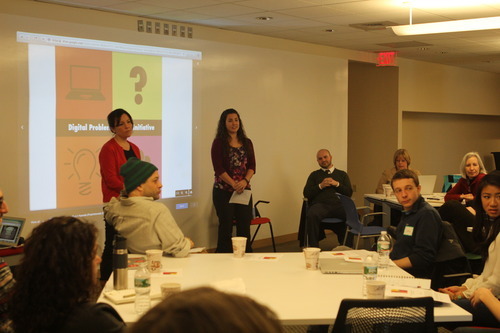
Check out more photos from our DPSI Mid-Year Workshop on Flickr!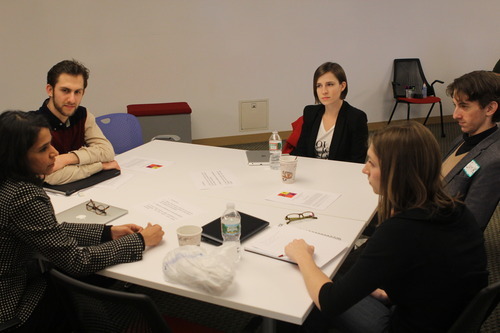
Take a closer look at all the teams and special guests presenting and workshopping during the Mid-Year workshop on February 13.

Check out more photos from our DPSI Mid-Year Workshop on Flickr!
On Feb. 13, the DPSI community gathered together for the DPSI pilot’s Mid-Year Workshop, co-hosted by the Berkman Center and the Bok Center for Teaching and Learning at Harvard. Special guests from outside the program, including Willow Brugh, Malavika Jayaram, Rey Junco, Laura Neuhaus, Leah Plunkett, Gosia Stergios,Hugo Van Vuuren, Sara Watson, joined us to take stock of the first semester’s work, discuss open questions each team is grappling with, and look ahead to outputs and final activities in the remaining months of the pilot. Sara gave a lightning talk about data and metaphor; Hugo spoke about the power of presence, physical space, and (missed) connections. Each team presented for six minutes on their work to date, followed by open conversation. Our awesome outside guests and the teams got together over lunch to dig into the nitty gritty and cook up new plans to advance their work. Some photo highlights are below; more media—including videos, a full photo album, and perhaps even an example of Willow’s vizthink—will follow soon.
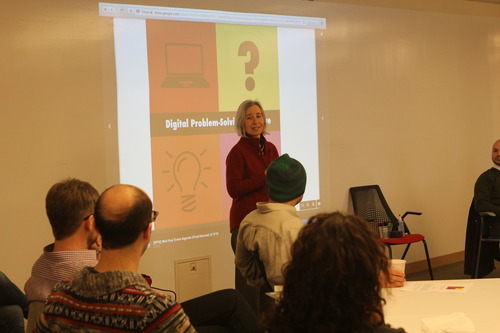
HLS Dean Martha Minow spoke to mentors and pioneers
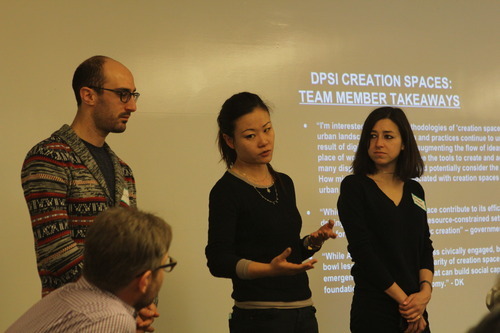
Pioneers on Team Innovation Spaces—Dan Koff, Tara Tan, and Courtnay Saunders, from left to right—discussed their visit to Harvard’s i-Lab and similar ventures
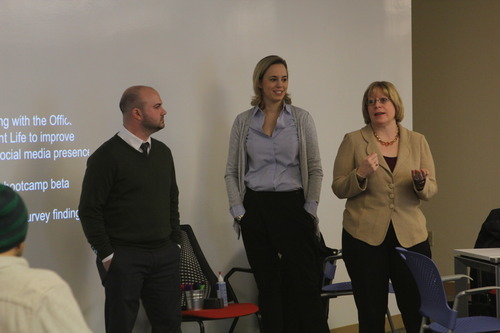
Mentors for team Social Media—Mike Petroff, Sandra Cortesi, and Perry Hewitt, from left to right—spoke about surveying students on how universities should interact with others online
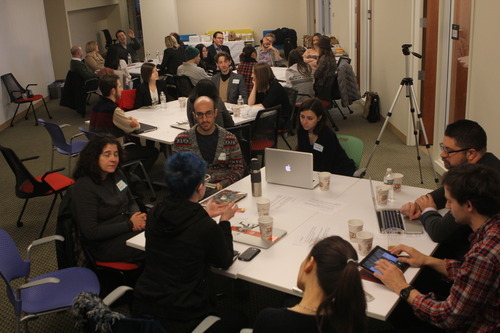
After presentations, teams broke up into respective groups to discuss their findings with experts. Willow has her back turned to the camera in the center of the table; going left are Gosia, Dan Koff, Courtnay Saunders, Chris Bavitz, Sam Peinado, and Tara Tan.
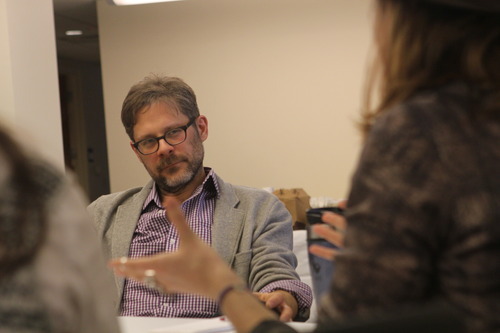
Museums mentor Matthew battles listened to Laura Neuhaus talk about her experiences within the Collection of Historical Scientific Instruments
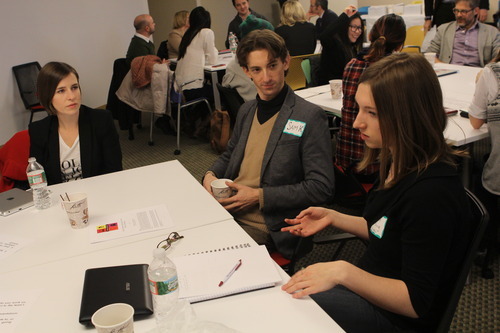
Elise Young (right), a pioneer on team Big Data and a 3L at Harvard Law School, exchanged ideas with special guest Sara Watson and DPSI team member S.J. Klein
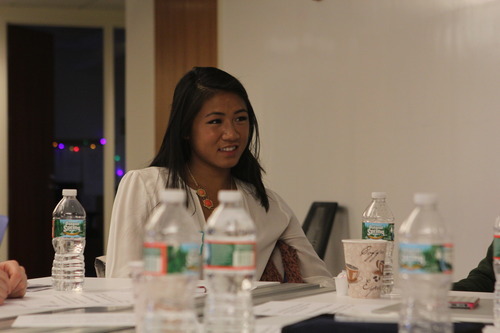
Vanessa Pham, a pioneer on team Social Medial, listened to Hugo Van Vuuren and Rey Junco
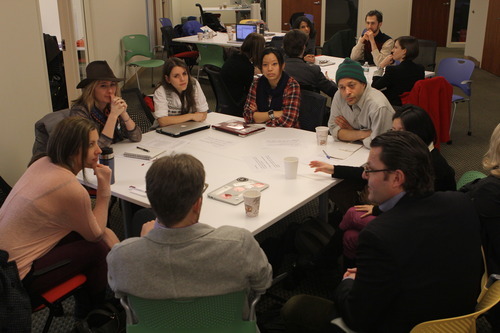
Team Museums thinks about the final weeks of the project with Berkman’s Executive Director Urs Gasser (bottom-right)
TL;DR
An innovation space should accommodate all kinds of group collaboration through mixed methods and both physical and virtual space. (And chalkboards!) The DPSI Innovation Spaces team shares insights from site visits to unique innovation-oriented centers in Boston.
Full Version
Academic life in Cambridge has its quirks. Many of us spend much of our time expanding our intellectual universes from the comforts of desks and dorms and relatively little time physically exploring the world outside of Cambridge. This fall, though, the Innovation Spaces team has shown the moxie the rest of us lack (at times): twice, they’ve crossed the river into Boston for two field trips – which complements the globe-wide searching of innovation spaces/centers/incubators/labs/etc. that they do virtually.
The Innovation Spaces team (also known by its lengthier title: Cataloging, Designing, Evaluating, and Developing Shared Practices Around Innovation Labs) visited Bolt, a hardware-oriented seed fund in Boston, and the Harvard i-Lab in Allston, where they chatted with i-Labbers about what being an innovation space really means in the context of their work. Whether it’s physical structures and layouts, programming (like workshops, contests, and more), or human interaction, the i-Lab has several ways of fostering and facilitating groups of people to work together on new ideas.
Here are a couple thoughts on the video highlighting the i-Lab field trip:
Something for us to avoid…
Advancing a common goal while acknowledging competing demands on team members’ time is a fundamental challenge all the DPSI projects face. One tool the Lightbox team is making use of is a tumblr for sharing links, images, essays, and ideas impinging on the work of designing a flexible, media-rich, curatorially-sensitive program for bringing data to life in the new Harvard Art Museum. We’re finding the tumblr especially useful for assembling a kind of mood book or pinboard for the project. In this early phase, the collection of posts clusters around charismatic precedents, demos of candidate display technologies, and links to essays that inform our approach as designers of a curatorial invention in art history. As the project matures, we’ll continue to document our own process there as well. The tumblr should not only facilitate our group’s work, however, but foster connections beyond the group as well—so if the flavor of posts there inspires a connection in your thinking, please do comment, link, and be in touch!
Dealing with the complexities of data in both programming and policy is an apt way of characterizing the last two months for the Big Data team. On the programming side, we’ve tackled a massive trove of information that is in need of organization and translation. Our product aims to resolve these discrepancies and provide a useful tool for educational researchers. On the policy side, we have dug even deeper into theFamily Educational Rights and Privacy Act (FERPA) and have found, to our surprise, that no one seems to have “the answer” on de-identifying student data in the MOOC (massive open online course) context.
The programming team of our group has been working on understanding the data we receive from EdX and HarvardX courses. We have started writing code to convert the data we receive into a more digestible form. We are also putting together basic sanity checks on the data. For example, if a student appears in the list of students considered for a certificate in a course, do they also appear in the list of users signed up for the course? After these basic checks, we will also continue interfacing with the policy side of the group to figure out exactly how this data can be made available to educational researchers. One interesting way to test the dataset is the concept of k-anonymity. For a user who has a certain set of attributes, are there at least k-1 other users that have the same set of attributes? This allows us to see how many users would be uniquely identifiable in a dataset and then work to make sure the attributes that are included give us a fully de-identified dataset.
On the user experience design branch of the team, we have created a plan for the design process and interviewed Justin and Sergiy, HarvardX Research Fellows, to get their insights on the existing user interface provided by edX. From their feedback, we have better defined the task at hand. The next goal is to meet with a few faculty members to develop use cases and continue the design process from there.
Our policy team has met with lawyers involved with EdX and other Harvard staff well-versed in FERPA and data privacy. These meetings have revealed how unclear FERPA is on online-only education. We have concluded, however, that FERPA applies to our project and thus that we need to identify levels of data for release to our different constituencies. The most challenging aspect of this is developing a de-identification process that will allow the release of student data to researchers without violating FERPA. Our next step is to complete a memorandum discussing our options and possible de-identification methods.
— Elise Young
This was an interesting piece about how user experience belongs to everybody.
“But lately, it has occurred to me that the user experience of a product actually doesn’t and shouldn’t belong solely to the designer.”
What’s the role of an educational institution in listening to, aggregating, or amplifying individual voices online? This is the question the new digital/social/mobile world serves up to all educational institutions — staffed primarily by digital immigrants — as they engage with digital native student populations. I think of it as the creepy/kosher divide — where is an institution inappropriately inserting itself into social media conversation, and where does it serve as a welcome connector/aggregator/amplifier? What do students appreciate, and what do they fear? What constitutes a student opting in for public participation, particularly when the institution commands a large audience?
Social media also raises questions of who should be paying attention, and where. Two recent articles highlight these challenges: should admissions offices be taking students’ social presences into account? And should schools, and secondary schools in particular, be watching current students on the internet?
We’re lucky to have a group of students interested in these and related topics joining the DPSI Social team. We have social media skeptics, like Lauren Taylor, who questions its ability to foster meaningful dialogue over soundbites. We have heavy social media users, like Zach Hamed, who work in the tech industry. We have insightful policy thinkers, like Chris Farley. And we have people interested in its applicability to both the university community and educational endeavor, like Andrew Reece.
As a first step, we’re pulling together a student survey to better understand current student social media usage and attitudes. After that, we’ll look at both a social media directory and constructive ways that social media can connect people around learning.
It’s early days for this group, with lots of questions and discussion. Many thanks to the team at the Berkman, and especially Sandra Cortesi, for helping propel us forward.
From the DPSI Launch Event –
Chris Bavitz, Colin Maclay, and Megan Larcom, mentors of the Innovation Labs team, share a bit about their vision for digging into questions of shared practices, good practices, trends, and more, related to innovation spaces.
Team Berkman brings you snack-sized cerebral fodder to ease your afternoon doldrums.
Dave Eggers broods about social media
Dave Eggers, influential writer and mission-minded entrepreneur of the aughts, adds a new theme to the eclectic mix his books have covered. As a whole, his narratives and works have been deeply personal as well as socially relevant – they include a fictionalized story of a Sudanese refugee, a Syrian immigrant’s experience in the aftermath of Hurrican Katrina, and the stories of former prisoners who’d been sentenced to death and then exonerated. Now, the slice of social life that Eggers’ new book, The Circle, gazes into is our networked culture thoroughly mediated (and owned) by social media (companies). New Yorker Elements blogger Betsy Morais sees value in Eggers’ pessimism, but uses it as a basis on which to look more deeply into the likes of Facebook and Google as they are today rather than to contemplate the literary merits of the novel.
What’s cooler: Morais cites the published work of DPSI Pioneer Diana Tamir, a doctoral student in Psychology at Harvard on the Big Data team, which found that “humans so willingly self-disclose because doing so represents an event with intrinsic value, in the same way as with primary rewards such as food and sex.” ¡Go Diana!
New minimalist blogging platform Ghost
After much anticipation, Ghost is here. Design and technology site The Industryoverviews the product, highlights its most attractive features, and tells you how you can get started with it. The skinny is that Ghost is all about one thing: writing. According to The Industry’s Gannon Burgett: “No extra bells or whistles, Ghost brings content center stage, making sure no unnecessary frills get in the way.”

(Image from: https://ghost.org/)
-Nathaniel, Team Berkman